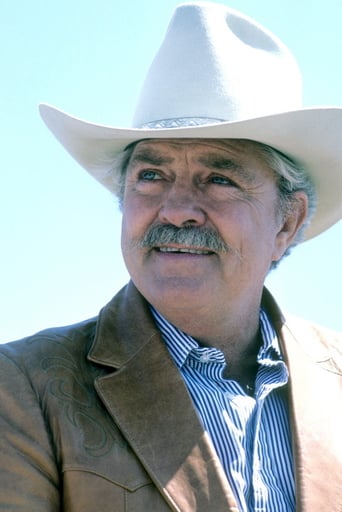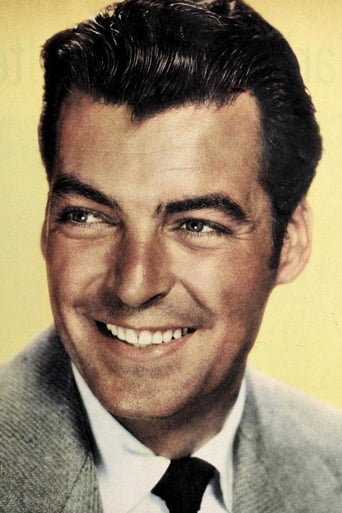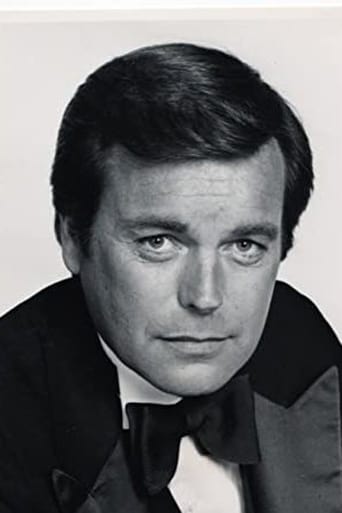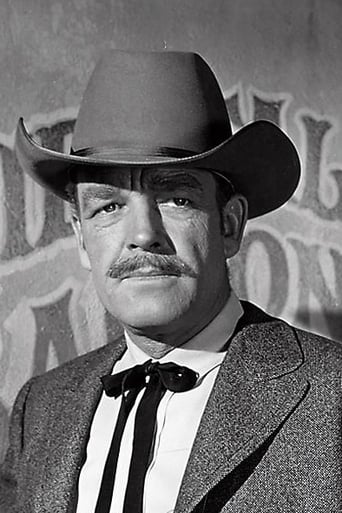brown7511
The script is well written, handling clichés very well. The direction is brisk and orderly. The actors are very professional, even the God-awful Robert Wagner. Watching Dale Robertson I am surprised that he didn't become a bigger star: he is at ease in front of the camera, charming when it is called for, and very realistic in his delivery. Rory Calhoun was quite adequate for an undemanding role. This really seemed to be a vehicle for the young Wagner. I must admit I have only enjoyed him in one movie in his career and generally find him uninteresting and sub-par. Was Zanuck gay and in love with him? I will never understand Fox pushing him; but the 50's did bring on the teenage girls in the audience. I guess that was it. Overall, this movie is a little gem that deserves more recognition. I recommend it.
weezeralfalfa
Another reviewer has provided an exhaustive summary of the screenplay, so I won't repeat that, as such, here. This is basically a coming of age story for a young stagecoach driver, Jess(Robert Wagner), who wants to upgrade from driving a small local stage pulled by 2 mules to driving a main line standard coach, pulled by 6 horses. He's also, for a short period, given the important job of deputy sheriff, in which he helps chase down some gold thieves, and is the only thing between them in a jail cell and a lynching mob. The latter episode is the psychological climax of the film, if not the action highlight. with the jail door being chopped down. Jess has to face his friend and mentor Race(Dale Robertson), who is at the forefront of the mob. He knows his first duty is to defend the two inmates from harm, however he may hate them. He threatens to shoot Race, but Race doesn't believe he will. He does, and Race falls to the floor, badly wounded in the abdomen. Fortunately, later he recovers. Meanwhile, the sheriff and a couple of aids arrive in back of the mob and help convince them to disperse. Thus, Jess accomplished his part of the defense by luck or design, stopping Race and the mob with his gun, but not killing Race. Anthony Perkins faced a similar situation, as a young sheriff under the tutelage of Henry Fonda, in "The Tin Star".Jess wasn't so lucky in his first experience as driver of the main stage. A large quantity of gold was being carried. The station master should have stuck to his original decision not to allow Jess to drive on this important run. Race and his Uncle Ben said they thought he was ready for the main line. Unfortunately, a badman by the name of Slade overheard Race mention the gold shipment in the saloon, and rode off to gather a gang to steal it. They took over a way station, and began shooting when the stage arrived. Race, Jess's shotgun guard, tells him to get the stage out of there without him. But, Jess ignored this standard procedure under such circumstances. As a result, he was soon badly wounded, the stage horses ran off without him and 2 passengers inside were killed by stray bullets, including Race's girlfriend. As a result , Jess lost his right to drive a stagecoach. That's when sheriff Tom(Roy Calhoun) offered to try out Jess as a deputy....This is also a coming of age story for Race, in that he had to learn the hard way that his brand of vigilante justice was not acceptable by the law. Incidentally, the title comes from a whip with silver handle given to Jess by Race on his first run with a 6 horses stage. The whips used for the 6 horses team were different from those used on the 2 mule teams.I consider this film to be as interesting and significant as the highly regarded "The Tin Star", which also deals with a coming of age story regarding a young sheriff. I find both of these more interesting and significant than the more highly regarded "High Noon", which deals with the same subject in an older man, In fact I rate them higher than "The Searchers". Here is a good place to discuss a little philosophy relating to vigilantism. From a moral(not legal) viewpoint, is vigilantism ever justified? I would say it can sometimes be justified if the justice system is corrupt, or otherwise ineffective, and you are positive you have identified the guilty and that they have perpetrated a crime of sufficient magnitude. Distinguishing between self-defense, vigilantism and dueling can be difficult. In the case of the firefight at the way station, clearly we have a case of self defense on the part of the stage people. When Race is chasing Slade and shoots him, Race is a vigilante and Slade is acting in self-defense, if he shoots back. But if Race were deputized or licensed as a bounty hunter, he is not a vigilante, technically, in trying to apprehend Slade, as long as his job description allows him to kill the fugitive, if necessary to apprehend him. If a reward is offered for the capture or slaying of a fugitive, then everyone can legally be the equivalent of a bounty hunter, and need not fear being labeled a vigilante, unless it is specified that the fugitive must be captured alive. Race wanted to finish Slade off after disabling him with a shot, but sheriff Tom made Race put down his rifle. A disabled, not dead, Slade is what Tom wanted....In the formal duels of the early 19th century for example, usually one challenged the other for a perceived deed or slight. They can be considered a fight between a vigilante(challenger) and one acting in self defense(the challenged). If there is a mutual agreement on a formal duel over a dispute, for example, both may be considered vigilantes.
zardoz-13
Harmon Jones' "The Silver Whip" is apt to be forgotten these days, but this horse opera is pretty good. The cast is a stellar one with Rory Calhoun as the stalwart sheriff, Dale Robertson as the vengeance driven stagecoach guard, and Robert Wagner as a young man learning the ropes of responsibility. Apart from its black & white cinematography, this Twentieth Century Fox western foreshadowed one of the studio's best westerns "Butch Cassidy and the Sundance Kid" when an outlaw with no place to run leaps off high rocks to plunge into a lake below. "Shane" novelist Jack Schaefer wrote the source novel "First Blood" that this above-average western was adapted from by "North West Mounted Police" scenarist Jesse L. Lasky Jr. penned. The casting of Robertson as the villain distinguishes this otherwise minor western. The last quarter hour of the action foreshadowed the John Wayne movie "Rio Bravo." "You sure never know what a kid's got inside of him," the manager of the stagecoach station observes after the Wagner hero proves his ability to follow orders and live up to his responsibility. Harmon Jones never lets the action slacken in this concise 73-minute western. Good dialogue.
Michael Morrison
Three of the stars became major television stars as well. And Rory Calhoun, Dale Robertson, and Robert Wagner made an excellent trio.Accompanied by two of the loveliest ladies, Lola Albright and Kathleen Crowley, as well as by some un-credited high-caliber performers such as the great John Doucette, George Cheesbro, and Edmund Cobb, they give us a tense western drama.Anger and revenge for cold-blooded killing always make for drama, and usually the audience, the viewers know which side to take. Here, though, there becomes a question of the right and wrong of lynch law. Who will defend the "official" law, and who will support the old "eye for an eye" law?The denouement is not what we expect.Until then, we are torn, because all the protagonists are good people and it is hard to decide for whom to root.Un-billed is Chuck Connors, but billed is the superb James Millican, as is J.M. Kerrigan in an undemanding but literate and important role."The Silver Whip" is available at YouTube and I highly recommend it.




